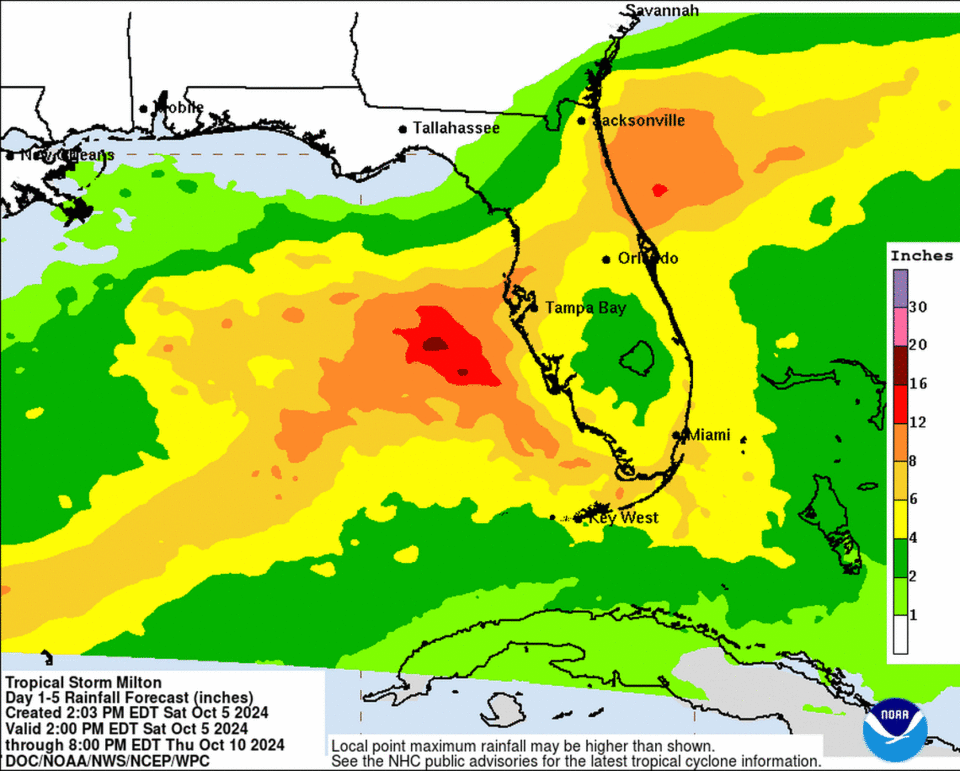Florida could see a Category 3 hurricane hit next week, bringing surge and high winds to the recovering west coast and serious flood risks to South and Central Florida.
Tropical Storm Milton officially formed Saturday afternoon, and the National Hurricane Center said it could strengthen into a hurricane as soon as Monday. By Wednesday, it could be a major Category 3 threat.
The National Hurricane Center’s first cone of uncertainty for Milton puts it on an eastward path through the Gulf of Mexico and into Florida’s west coast on Wednesday — a second blow for a region still catching its breath from the devastating Category 4 Hurricane Helene.
Gov. Ron DeSantis declared a state of emergency in 35 counties, including Miami-Dade and Broward, and directed state agencies to help expedite the cleanup in counties that still have piles of debris from Helene on their roads.
“We will continue staging state assets to prepare for efficient search and rescue, power restoration, and roadway clearing,” the governor wrote on Twitter.
Where the eye will come ashore is hard to predict this far out and will continue to shift. The latest track takes it onshore right through the middle of Tampa Bay. More changes are expected with every update as the storm draws closer.
However, all of South Florida will feel the impacts of this storm, regardless of where it makes landfall. Tropical storm winds are expected to expand 150 miles from the center, which will reach Miami-Dade and Broward.
Jamie Rhome, NHC Deputy Director, said in a video briefing Saturday afternoon that it’s too early to get into specifics of who gets what, when, but it’s the right time to prepare.
“The million dollar question is where is Milton gonna go, and what impacts may it bring,” he said. “Regardless of where the storm tracks, it’s going to produce a large area of heavy rain and potential flooding.”

The major threat from this storm is flooding. It will be a risk for places far outside the direct path of the storm and the cone.
Parts of Florida were already getting drenched on Saturday, a trend expected to continue through Tuesday and enough to cause flooding on its own. Miami-Dade and Broward County were already under flood advisories Saturday morning.
Already soggy ground will flood even faster with just a little bit of water. The new system is expected to bring heavy rains over the southern half of the state.
“Best way to think about it is that Florida will see a one-two punch. The first one will bring us rain Sunday into Monday with an area of low pressure along a stalled out front. Then the 2nd, main punch from tropical storm or hurricane approaches on Tuesday into Wednesday,” Matt Devitt, chief meteorologist for Southwest Florida’s WINK news, posted on Twitter.
Read more: Before a hurricane brings more rain, South Florida will see flooding in next few days
High winds
The current forecast calls for Milton to strengthen to a Category 3 hurricane by the time it reaches Florida, with 115 mph sustained winds. Further strengthening isn’t out of the question, as the latest forecast said “upward adjustments could be required.”
That’s enough to bring storm surge to the West Coast — again.
“Even if this doesn’t realize a high end wind core, it will have the potential for significant surge inundation,” Andrew Moore, a meteorologist for Arch Reinsurance, wrote on Twitter.
Rhome, the deputy director of the NHC, told residents on the West Coast that the storm surge could be significant enough that they may need to evacuate and urged Floridians to find out whether they’re in an evacuation zone now.
“While no evacuations have been ordered, they may be necessary later,” he said.

The strength of the storm at landfall depends on what happens to it on the way. One factor in favor of strengthening is the warm waters of the Gulf, which didn’t cool off very much after high-speed Helene churned through two weeks ago. Sea surface temperatures, or SST, are above normal for much of the Gulf.
“Most of the Gulf is above average SST still, and the loop current is prominent. Shelf south of Tampa is extremely warm as well. Lots of potential fuel,” wrote Andy Hazelton, an associate scientist at the hurricane research department at NOAA, on Twitter.
Kieran Bhatia, senior vice president at reinsurance firm Guy Carpenter, called it “the red carpet treatment for rapid intensification.”
“Milton will experience a sea surface temperature and potential intensity environment that is rarely seen during September (let alone October,” he posted on Twitter.
The National Hurricane Center explicitly calls for rapid intensification on Monday, when the storm is expected to become a hurricane.
EMEA Tribune is not involved in this news article, it is taken from our partners and or from the News Agencies. Copyright and Credit go to the News Agencies, email news@emeatribune.com Follow our WhatsApp verified Channel



